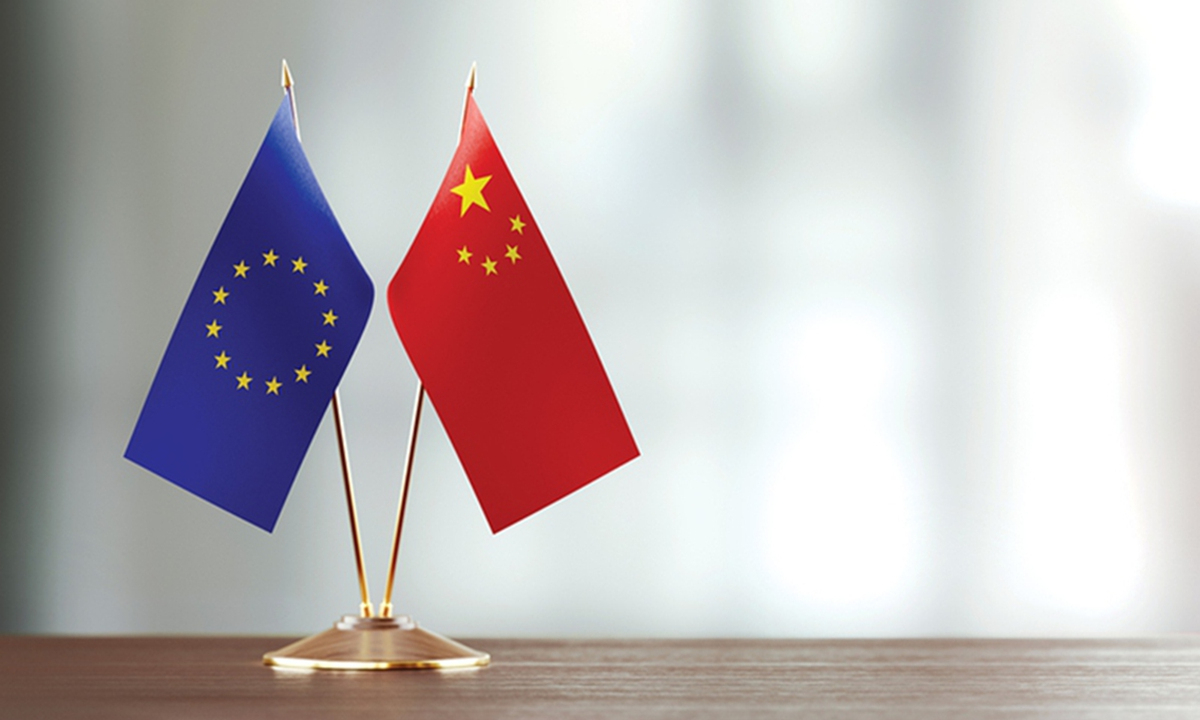EU needs to be free from US tutelage in dealings with China: European Parliament member

Photo: VCG
Editor's Note:
On Thursday the 24th China-EU Summit will take place in Beijing, China, marking the first in-person summit in four years. "This summit should be an opportunity for the EU to resume and strengthen its ties with China and develop a mutually beneficial agenda of its own," said Manu Pineda (Pineda), a European Parliament member, in an interview with Global Times (GT) reporter Su Yaxuan. Pineda hopes that this forum can serve to bring positions closer together and develop good economic, trade and other relations between the EU and China.
GT: What signals do you think the upcoming China-EU Summit will convey? What are your expectations for the summit?
Pineda: This summit should be an opportunity for the EU to resume and strengthen its ties with China and develop a mutually beneficial agenda of its own. Unfortunately, in recent years we have seen how the EU's approach to China has been influenced more by US pressure than by our own interests. Washington is dragging the EU into its imperialist agenda of confrontation with China, but the truth is that the peoples of Europe have much to gain from cooperation and trade with China. Anything less than strengthening diplomatic and economic ties and exploring new mechanisms of cooperation will be a failure. Let us hope that European governments know how to read the moment of geopolitical transition and commit themselves to a new framework of relations with China, free from US tutelage, and understand that the EU is staking a large part of its future on improving relations with China as an aid to resolving the multiple problems we have at the moment.
GT: In your opinion, will more dialogue and engagement mean the EU will become more rational and pragmatic in its dealings with China?
Pineda: Although the advancement of multilateralism and multipolarism is unstoppable, making the EU's short-sighted strategy evident, in my opinion the dependence of European capital on US capital means that the economic and political elites continue to cling to their alliance with the US. They put their own interests and those of their capitals before the interests of the peoples of Europe.
I hope that the upcoming summit can serve to bring positions closer together and that the EU reverses some of its policies, and for this reason we on the European left will work to show how much the peoples of Europe stand to gain from good economic, trade and other relations between the EU and China.
GT: You have mentioned that improving relations with China benefits the EU and its people. Why do you have such confidence in cooperation with China?
Pineda: This is not speculation. It's a fact. Firstly, we need to commit to multilateral relations. And secondly, we can see these benefits as several European countries have signed economic and social memoranda of understanding with China and projects are underway, generating wealth. China is the EU's largest trading partner, with imports flowing into Europe at over 22 percent in 2021. Improving supply chains, infrastructure and interconnection should be a strategic objective for Europe because it would increase the quantity of goods exchanged, diversify it and reduce costs for our peoples. In this regard, I would like to point very specifically to the Belt and Road Initiative (BRI), which is now 10 years old, as a concrete and tangible proposal to advance cooperation with China for mutual benefit. Additionally, the Global Security Initiative, put forward by President Xi Jinping, places the defense of the United Nations Charter as the basis for international relations. This can help resolve the conflicts tearing Europe apart through negotiation and diplomatic agreement.
GT: There is a view that Europe has a tendency to blindly follow the US, being quick to align with it on every issue. This damages Europe's ability to independently manage its affairs and compromises its diplomatic autonomy. You said that Europe should abandon its subservience to the US. In your view, what is causing Europe's growing subservience, and how should it be abandoned?
Pineda: As I have said before, the cause of this servility is the dependence of European capital on the multinational capitalism which is based in the US.
That is why we have been characterizing the EU for decades as a supranational construction of a neo-liberal character, without an autonomous foreign policy and whose action in the international sphere is in support of US imperialism. It is a problem of the construction of the EU itself, conceived as a network of institutions that are little or not at all democratic, allowing the maximization of profits for the respective national bourgeoisies at the expense of national sovereignty and the rights of the working classes.
GT: The EU defines China as a "cooperation partner," " economic competitor, " and "systemic rival" in its "holy trinity" framework. Due to the definition of "systemic rival," the EU has taken a series of "de-risking" actions, such as designating Huawei as a high-risk supplier, launching anti-subsidy investigations into Chinese electric cars and threatening similar investigations into Chinese wind turbines and steel products. What do you think of Europe's de-risking measures and actions?
Pineda: The measures adopted by the EU are the best example of submission to the US. When the US identifies China as a challenge identifies China as a systemic enemy, the EU elites apply it here, even if it is detrimental to our interests, so these measures should be the first to be reversed.
The measures against Chinese software and technology have been taken without evidence of information leaks. The restriction on the purchase of microchips is creating tension in our supply chain and delays in the production of goods — harming our industry. And with regard to electric cars, this is a clear contradiction because our commitment must be to diversify our vehicle fleet with low-emission vehicles, and here China is an indispensable partner. Reality shows us that China is not Europe's rival, but a reliable partner.
GT: Within EU-China cooperation, which areas of conflict can be resolved, or alleviated? What kind of China-EU relationship should Europe strive to establish in order to best serve its own interests?
Pineda: I think there is a problem of conception. European analyses are made from an American rather than a European perspective, and this leads to China being seen as a rival rather than a partner. The EU has no territorial conflict, no diplomatic dispute, no major clash of interests with China. China is a major power with a large trade volume and a level of development that can be beneficial and complementary to the EU. Specifically, China's level of scientific and technological development should be seen as an opportunity rather than a risk, and cooperation in this field would help to improve European industry. The same could be said in the cultural field, strengthening ties between ancient peoples; in tourism; in transport... It is time for the EU to redesign its relations with China and adapt them to the 21st century.
I'll conclude by pointing out that this upcoming summit between China and the EU should lead to a call to strengthen multilateralism and to work to find a negotiated solution to conflicts in the United Nations, starting with putting an end to the war in Ukraine, which is causing great harm to the whole of Europe.

